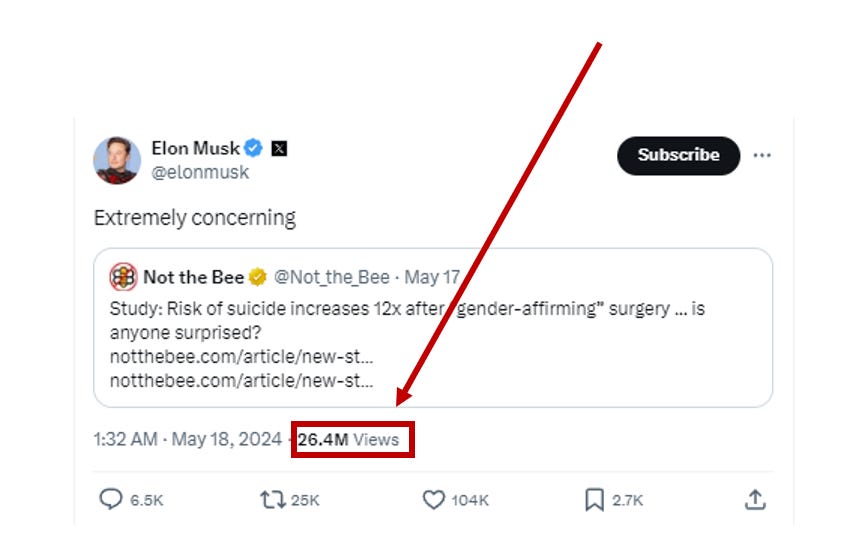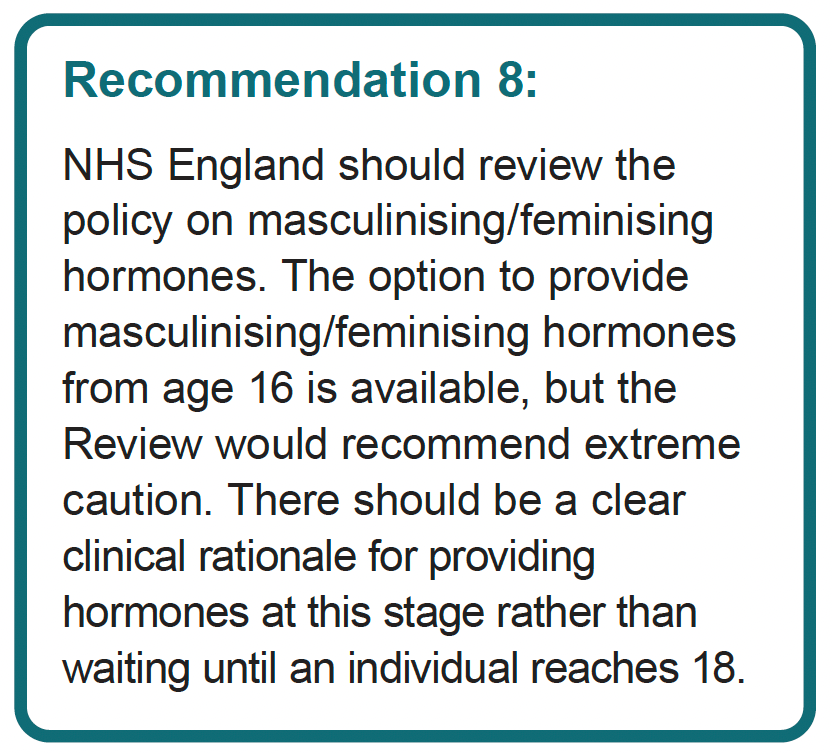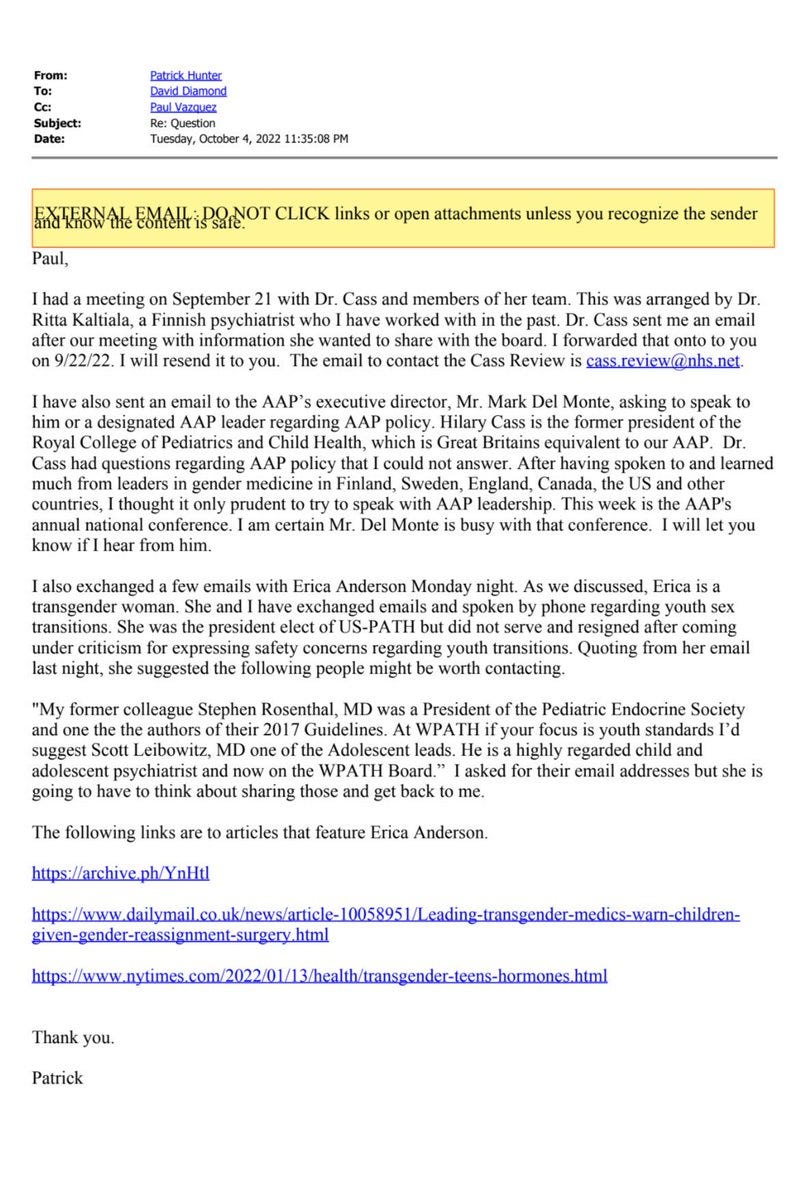Political commentary & analysis
Urgent concerns arise when congressional staff face ethics investigations
Ultimately, how can we hold elected representatives to a higher standard such that they model good behavior for their employees

WASHINGTON -Congressional staff tend to avoid engaging in conduct that could reflect poorly on the members they represent or that which would otherwise bring them out from behind the scenes and into the spotlight.
Last week, however, was the second time in which I broke a story about a chief of staff on Capitol Hill who found himself the subject of a complaint to the U.S. House Ethics Committee, the body whose primary responsibility is investigating reports of unethical and unlawful conduct by America’s elected representatives.
In the first, Marjorie Taylor Greene filed a report against Democratic Rep. Jake Auchincloss’s top aide because he had placed stickers over a transphobic sign that the far-right Georgia congresswoman had displayed outside her office.
The second complaint came from an official with the Biden-Harris administration over an especially combative and anti-trans email that was sent by the highest-ranking deputy in a West Virginia Republican’s Congressional office.
The two cases are not otherwise analogous. As the emissaries of lawmakers who are responsible to their constituents, staff should be held accountable for out-of-bounds behavior like sending offensive emails to harass colleagues on Capitol Hill or in the federal government.
By contrast, decorating a poster in the Longworth House Office Building without permission is hardly a crime that should be escalated to the Ethics Committee, particularly not when the poster is offensive to members of a marginalized community and was hung in the first place to provoke a colleague across the hall who has a trans daughter.
If a monthslong probe exploring whether a career Hill staffer had brought discredit upon the House of Representatives with his stickers was not absurd enough, it was kicked off by none other than Marjorie Taylor Greene, who has been guilty of that charge virtually every day since she was elected. (Recall, for instance, that she has called for violence against her political opponents, including by publishing a video on social media in which she said then-House Speaker Nancy Pelosi deserves the death penalty.)
A member of Congress wields a tremendous amount of power relative to even the seniormost Capitol Hill staff, a fact that was brought into sharp relief for Auchincloss’s chief of staff as he sought to defend himself against not just the committee’s investigation but also an affidavit by the Capitol Police in support of an arrest warrant along with threats and harassment so severe that his home was monitored by law enforcement.
The House Ethics Committee declined to comment when I reached out last week to confirm receipt of the complaint filed against the GOP staffer, just as they had refused to provide information about the status of the case initiated by Greene’s report.
The committee’s Senate counterpart is even more of a black box.
An article by the Campaign Legal Center, a nonpartisan government accountability group, notes that in the recent indictment of New Jersey Democratic Senator Bob Menendez, “the shocking details revealed by the allegations seemingly had no end.”
The evidence against him was sufficiently flagrant and longstanding, the article argues, to “beg the question: Is the Senate incapable of finding and rooting out potential corruption before it becomes a crime?”
Part of the problem, according to CLC, is that the Upper Chamber’s ethics committee provides no means by which a complaint can be seen through to its investigation and resolution. The public knows very little about what the committee does, perhaps because the committee does very little: a study in 2023 found that none of the 1,523 reports that were filed over a period of 15 years resulted in any formal disciplinary sanctions.
Obviously, full transparency is impossible when sensitive information must be kept confidential to protect the integrity of an investigation. However, and especially if we are going to continue seeing complaints against Congressional staff rather than the lawmakers they serve, the committees should provide more insight into their processes and decision making.
Measures could include safeguards designed to mitigate the risk of unfair outcomes when investigations are brought by members of Congress and target those who have far less power. A mechanism requiring the investigators to share more information about cases under their review, to the extent possible, would also be wise — because even when the alleged conduct by a staffer may warrant a complaint, time and resources might be better spent rooting out misconduct by members of Congress, which is almost always far more consequential.
We should also contend with the question of whether ethics committees are ever the appropriate place to explore and adjudicate allegations against staffers, since members are fully capable of enforcing the rules in their offices.
As demonstrated by the long and tortured process through which George Santos was finally booted from Congress, getting rid of an elected lawmaker is far more difficult than, say, firing a chief of staff.
Ultimately, perhaps the right question is: how can we hold elected representatives to a higher standard such that they model good behavior for their employees as well as for their constituents and Congressional colleagues?
******************************************************************************************

Christopher Kane is the White House Correspondent and Capitol Hill reporter for the Washington and Los Angeles Blade newspapers.
COMMENTARY
LGBTQ representation in corporate leadership crucial, experts say
Experts emphasize economic and cultural benefits of diverse leadership

In an era of social and political uncertainty, the importance of LGBTQ representation in corporate leadership has never been more critical, according to diversity experts.
Despite increasing visibility, LGBTQ+ individuals continue to face discrimination and challenges in the workplace. A recent study by GLAAD found that 70% of non-LGBTQ adults believe in the importance of inclusive hiring practices. However, representation in top corporate positions remains inadequate.
“Having LGBTQ+ individuals in C-suite positions is more than an issue of fairness — it drives real cultural change,” said Aidan Currie, Executive Director of Reaching Out MBA.
According to Gallup data, 7.6% of all U.S. adults identify as LGBTQ, with the percentage rising to 22% among Gen Z adults. This demographic shift underscores the need for diverse leadership in corporate America.
The impact of LGBTQ+ representation extends beyond social progress. McKinsey & Company’s 2020 report found that companies in the top quartile for gender diversity were 25% more likely to see higher profitability. Similar principles apply to LGBTQ+ representation.
However, challenges persist. The FBI reports a 19% increase in hate crimes targeting LGBTQ+ people, highlighting ongoing societal issues.
To address these challenges, organizations like Reaching Out MBA (ROMBA) are working to increase LGBTQ+ influence in business. ROMBA’s annual conference brings together LGBTQ+ MBA students, recruiters, and business leaders.
This year, ROMBA is introducing PRIZM, a multi-day event for experienced, mid-career LGBTQ+ business professionals. The event aims to equip participants with skills needed to advance to C-suite roles.
“It’s incumbent upon us to make sure our community is prepared to lead, and it’s incumbent upon corporate leaders to stand behind their commitment to inclusion,” said Zeke Stokes, former Chief Programs Officer at GLAAD.
As the business landscape evolves, the push for greater LGBTQ+ representation in corporate leadership continues. Experts argue that this representation is not just a matter of equity, but a crucial factor in driving innovation, profitability, and positive societal change.
For more information on ROMBA and PRIZM, visit https://reachingoutmba.org/
Written By AIDAN CURRIE and ZEKE STOKES
#
Political commentary & analysis
Family Research Council falsely claims Pride events ‘scaled back’
“Pride is a time to celebrate all the progress that has been made; especially within sports over the past decade”

WASHINGTON, D.C. — Borrowing a tactic from former president and convicted felon Donald Trump, the Family Research Council’s in-house propaganda machine published a lie in hopes it will be accepted by the uninformed as truth. In this case, the false claim is headlined “Major Sports Leagues Dump Pride, as Biden Fights to Fill the Void.”
Suzanne Bowdey, editorial director and senior writer at the FRC’s outlet, The Washington Stand, made that claim in the form of an online commentary.
“…Not just major brands but major leagues are making the conscious decision to sit this month out, desperate to protect their profits from the consumer outrage that’s burned down brands like Bud Light and Target,” she wrote. “…America’s five major sports leagues pushed the LGBT holiday to the sidelines. Unlike past years, the rainbows that used to color the logos of the NHL, NBA, NFL, and MLS for the month are gone.
“Only Major League Baseball dipped its toes into the 2024 Pride waters — a brief experiment that they abandoned when fans went berserk. After its ‘Baseball is everyone’s game’ post on the morning of June 1, users exploded in the comments…”
Exploded? Well, maybe, as the typical homophobic trolls were met with glitter and glee and anticipation of hate messages so typical for X these days.
And some others just admired the rainbow logo.
To verify Bowdey’s claims, the Los Angeles Blade reached out to media representatives for a wide range of sports leagues and checked the social media pages for the MLB, NFL, NBA, WNBA, NHL teams like the Edmonton Oilers, the Philadelphia Flyers and the league’s players association, MLS and NASCAR to see if they had indeed “dumped” Pride.
Nope, although as Pink News reported, there are several NFL teams that did not rebrand their logos with rainbow colors, despite the league’s Instagram post, including Harrison Butker’s Super Bowl champion Kansas City Chiefs.
Contrary to reports in right-wing media, the Green Bay Packers are one of the 20 teams that support Pride Month on its social media, and even the teams that aren’t on board still sell Pride merch on their websites.
Football is for everyone. 🏳️🌈 pic.twitter.com/ycTHN5u09t
— Green Bay Packers (@packers) June 4, 2024
The Blade also reached out to public relations specialist Paulo Senra, who founded PushPull PR nearly a decade ago and for nearly a year has been Canada Soccer’s Chief Communications and Content Officer. Senra called Bowdey’s op-ed “way off base.”
“Just look to what U.S. soccer is doing with its Pride jerseys. We would know, as we are partners working with them on their Pride game and jersey auction. Any suggestion to the contrary is just simply factually incorrect,” Senra told the Blade. “All the major sports leagues are celebrating Pride this year. One just has to quickly search social media posts to see that leagues and individual teams are sharing their Pride stories and support for the community in many ways from games, donations, parade participation and engaging with training resources we provide.”
Some examples:
As the Blade has reported, the NHL reversed course last year and dropped a ban on rainbow-colored Pride tape on players’ hockey sticks to honor the LGBTQ+ community at Pride games, which the NHL celebrates on its website.
The NBA, which could see the Celtics crowned champions tonight, is also a big supporter of Pride, both as a league and through its individual teams, like the Dallas Mavericks.
Happy #PrideMonth! 🏳️🌈🏳️⚧️ This month and every month, we stand with the LGBTQ+ community.#MFFL pic.twitter.com/NJ2DADjZZF
— Dallas Mavericks (@dallasmavs) June 1, 2024
The league provided the Blade with a statement of its “core values” of equality, respect and inclusion.”
“As part of our ongoing commitment to equity, diversity and inclusion, the NBA and WNBA family works in partnership with leading LGBTQ+ advocacy organizations — including Athlete Ally, GLAAD and GLSEN — to support a variety of programs and initiatives designed to promote LGBTQ+ equality and create a more inclusive environment in our leagues and across sports year-round,” the NBA said in its statement to the Blade.
“The NBA and WNBA are engaging players, teams, and fans through a variety of activations that celebrate the league’s year-round commitment to the LGBTQ+ community and inspire all to be more inclusive,” said the NBA through its statement. The league also boasts a Pride employees resource team: “Started in 2015, NBA Pride aims to bring together the league office’s LGBTQ+ employees and allies to foster an environment in which LGBTQ+ employees feel empowered and encouraged to bring their whole selves to work each day. The Pride ERT was the first LGBTQ+ employee resource team in a major professional sports league, and hosts regular programming for league employees.”
Happy Pride Month! 🏳️🌈🏀 pic.twitter.com/NazB7obEYS
— NBA Cares (@nbacares) June 1, 2024
The NBA had a float in last year’s New York City Pride March and in its statement to the Blade, the league promised it will do so again this year.
NYC at the Pride Parade.
— Viral News NYC (@ViralNewsNYC) June 25, 2023
An @NBA float shows it support for the #LGBT community
For licensing email [email protected] pic.twitter.com/CojfhVlAwI
“Pride is a time to celebrate all the progress that has been made; especially within sports over the past decade,” said Senra. “We’re proud of work we have done to make the world of sports more inclusive and a safe space for all. Pride is also an opportunity to reflect on opportunities where we can continue to have a lasting impact and continue the work year-round to ensure that anyone connected to sport as a player, fan, coach, official or executive can be a part of it authentically and welcomed by their organization.”
Political commentary & analysis
Project 2025: Far right’s laundry list also targets LGBTQ+ rights
Project 2025 extends to altering the post-WWII international order, challenging established human rights declarations

MONTGOMERY, Ala. – A dystopian Handmaid’s Tale style future may soon be underway in the US, should former President Donald Trump and the Republicans seize the upcoming election. Backed by billions of dollars in funding, and over 100 organizations, many of which are tied to hate groups and white nationalists, the far right’s laundry list of goals includes removing all women’s reproductive rights, and firing all LGBTQ+ employees.
This plan is called Project 2025, and it is terrifying for the minority groups it calls out.
In a recent Zoom discussion attended by the Blade, Wendy Via and Heidi Beirich, co-founders of the advocacy The Global Project Against Hate and Extremism (GPAHE), shed light on the disturbing realities of the far-right’s manifesto that has gained surprisingly little media coverage thus far.

Project 2025, led by the far-right Heritage Foundation and supported by over 100 organizations, is a 920-page plan aimed at reshaping America into a more authoritarian and Christian Nationalist state.
The plan threatens to roll back constitutional rights for women, LGBTQ+ people, immigrants, and people of color, and proposes centralizing power in the executive branch. Project 2025 aims to radically reshape the U.S. government, systematically dismantling protections for LGBTQ+ individuals, women, people of color, immigrants, and disabled individuals.
One excerpt from Project 2025 reads: “The next conservative President must make the institutions of American civil society hard targets for woke culture warriors. This starts with deleting the terms sexual orientation and gender identity (“SOGI”), diversity, equity, and inclusion, gender, gender equality, gender equity, gender awareness, gender-sensitive, abortion, reproductive health, reproductive rights, and any other term used to deprive Americans of their First Amendment rights out of every federal rule, agency regulation, contract, grant, regulation, and piece of legislation that exists.”
Project 2025 entails a coordinated attack on people of color and immigrants, proposing measures such as militarizing the border and executing mass deportations. Further proposals include re-assigning control of the FBI to the president, giving the ruler of the free world the power to turn the FBI on anyone not following through on the rules outlines by Project 2025.
Trump’s plan to increase law enforcement and military presence, coupled with the potential use of the DOJ and FBI to target marginalized groups, raises alarms about civil rights protections.
The militarization of law enforcement under Project 2025 threatens the safety and freedoms of vulnerable populations, and all those who do not fall under the category of cisgender heterosexual, white, Christians.
Authors of Project 2025 seek to erase terms like “gender identity” and “diversity” from government language, further marginalizing LGBTQ+ individuals. The plan also includes proposals to demonize the LGBTQ+ community, painting them as societal threats through various government agencies.
Charlie Kirk, founder of Turning Point USA (TPUSA) and a Project 2025 advisor, continues to promote controversial Christian Nationalist views. At a Phoenix rally, he compared the fight against “wokeness” to World War II battles against totalitarianism. TPUSA, with significant financial backing, actively promotes conservative values and opposes LGBTQ+ rights.
The project calls for the removal of LGBTQ+ protections in employment, education, and adoption, and aims to criminalize gender-affirming care. LGBTQ+ individuals face the threat of job termination and increased legal persecution under this plan.
Under these rules, anyone who can be proven or, perhaps, even suspected of being hired under Diversity and Inclusion initiatives, will be fired.
Christian nationalism is a keystone in shaping Project 2025, which includes efforts to restrict reproductive rights in addition to LGBTQ+ issues. The plan’s advocates seek to make the Religious Freedom Restoration Act (RFRA) federal law, promoting Christian traditional family values at the expense of individual freedoms.
This includes allowing orphanages to turn away potential adopters who adhere to any faith other than Christianity. Further, Project 2025 threatens to eradicate adoptions as a whole, as the manifesto calls for a child’s “right” to be raised by their mother and father, regardless of the economic and/or mental states of said parents. The act would also limit or eliminate the right to practice one’s religion of choice, thereby annihilating the separation of church and state.
Project 2025 extends to altering the post-WWII international order, challenging established human rights declarations. Plans to fire civil servants and replace them with political appointees were also discussed, raising concerns about the impartiality and stability of federal agencies.
One zoom attendee voiced concerns about the defunding of LGBTQ+ nonprofits and the potential for increased investigations and demonization of organizations working with immigrants. The implementation of Project 2025 through executive orders by a conservative president poses a substantial risk to this concern.
Emphasizing the critical need to act now, speakers highlighted the growth of a far-right international network since Trump’s presidency, which could lead to the criminalization of LGBTQ+ individuals. The overturning of landmark cases like Lawrence v. Texas could pave the way for further legal persecution.
Political commentary & analysis
2024 European elections: A turning point for LGBTQ rights?
After the elections, right-wing parties are gaining substantial ground and concerns about the potential impact on LGBTQ rights are growing

By Amber Laenen | BRUSSELS, Belgium – As the dust settles after the 2024 European Parliament elections, right-wing parties are gaining substantial ground and concerns about the potential impact on LGBTQ rights are growing. The projected surge in support for far-right parties, however, was not as pronounced as some had expected.
Monday morning’s estimates indicate the far-right’s presence has, however, undeniably increased.
The European Conservatives and Reformists (ECR) gained four seats, bringing their total to 73. The Identity and Democracy group saw a significant rise, gaining nine seats to reach 58. Together, these nationalist, anti-immigrant parties now hold around 130 seats, reflecting their growing influence.
Marine Le Pen’s National Rally in France, which clinched over 32 percent of the vote, and the Alternative for Germany securing approximately 16 percent of the vote and becoming the country’s second-largest party, ahead of Chancellor Olaf Scholz’s Social Democrats, in particular could affect the broader political dynamics in Europe.
Despite the gains for the far-right, the mainstream conservative European People’s Party (EPP) emerged as the largest group, securing 189 seats, an increase of 13 seats. The two other centrist parties, the Progressive Alliance of Socialists and Democrats and Renew Europe, however, experienced losses that eroded the political center. S&D finished with 135 seats, losing four, while Renew Europe saw a significant reduction, finishing with 83 seats.
European Commission President Ursula von der Leyen celebrated her party’s victory and called for cooperation among centrists to ensure a “strong and effective Europe.” She emphasized the responsibility that comes with the election results, noting the need for stability amid growing support for extremist parties.
The election’s biggest losers were the Greens, who saw their support decrease by 25 percent, ending with 53 seats. The Greens, despite this setback, could still play a crucial role in supporting centrist majorities as an alternative to further-right parties.
All eyes are now on the election winners, the EPP.
Von der Leyen has indicated her readiness to work with certain parties sitting with the hard-right ECR. Initial signals from the EPP camp, however, suggest it will stay true to its traditional allies at the center. Von der Leyen has offered to work with socialists and liberals to build a “majority in the center for a strong Europe,” underscoring the importance of maintaining a united front against extremism.
The narrow margins in the new parliament could lead to issue-by-issue coalitions, especially for sensitive issues such as those related to the European Green Deal. This limited room for maneuver could see the EPP relying on partners to its right on an ad hoc basis, including for critical decisions that include ushering in a new commission president. Von der Leyen’s future hangs in the balance as she seeks re-election. National delegations within her EPP grouping and support from lawmakers of Giorgia Meloni’s Brothers of Italy party, which clinched 24 seats, will play a crucial role in her bid to secure an absolute majority of 361 MEPs.
The implications for LGBTQ rights in Europe are significant.
Far-right parties, known for their conservative social values, might push for policies that restrict LGBTQ rights, opposing marriage and adoption by same-sex couples, and challenging the legal recognition of gender identity and access to healthcare for transgender people. Such potential policy reversals represent a significant setback for the LGBTQ community.
The rising popularity of far-right ideologies also poses a risk of heightened discrimination and hate speech against LGBTQ people.
Hate-motivated violence and exclusion are likely to become more prevalent, along with more frequent and aggressive hate speech targeting the LGBTQ community. Additionally, far-right parties often promote traditional gender roles and family structures, potentially undermining the visibility and acceptance of LGBTQ identities. Nonbinary, transgender, and intersex people could face increased stigmatization.
The 16th annual Rainbow Map that ILGA-Europe publishes underscores the importance of legal protections for LGBTQ people.
Authoritarian leaders across Europe continue to use the scapegoating of LGBTQ people to divide and mobilize their electorates. Several countries, however, have demonstrated robust political will to advance and protect LGBTQ rights. Some countries — Germany, Iceland, Estonia, and Greece — have made significant strides in protecting LGBTQ rights through improvements in legislation and anti-discrimination measures. Belgium, Cyprus, Norway, and Portugal have introduced bans on conversion therapy practices.
Countries such as Italy, on the other hand, show the consequences of stalling legislative protection for LGBTQ people. Moreover, EU accession countries, including Turkey and Georgia, are actively eroding human rights and fundamental freedoms.
The Rainbow Map illustrates the stark differences in how European countries handle LGBTQ rights.
While some nations are making significant progress, others are regressing, influenced by the far-right’s growing power. Germany, Iceland, Estonia, and Greece, for example, have made noteworthy improvements in their legal frameworks to protect LGBTQ people. Germany prohibited hate crimes based on sexual orientation, gender identity, and sex characteristics, while Estonia and Greece amended their laws to allow same-sex couples to marry and adopt children.
In contrast, Italy, which has dropped in the rankings due to stalling legislative protections, exemplifies the risk of complacency that many activists in Europe fear. The far-right’s influence can quickly lead to the erosion of rights if proactive measures are not taken. The situation is even more dire in EU accession countries such as Turkey and Georgia, where LGBTQ rights are actively being rolled back.
The stakes are high as Europe moves forward from these elections.
The EU must address the rise in political hate speech and new tools of oppression that include Russia’s criminalization of the LGBTQ movement. Without strong laws and policies to protect LGBTQ people, the foundation of safety, rule of law, and democracy in Europe is at risk.
The balance of power remains delicate as the European Parliament prepares for its new term.
The first major test will be the approval of the new European Commission president, which is set for July. Von der Leyen, who narrowly won her position five years ago, will need to secure broad support among centrists while navigating the complex dynamics of the new parliament. The secret ballot process adds an additional layer of uncertainty, making her re-election far from guaranteed.
The 2024 European elections have set the stage for potentially significant changes in the legislative and social landscape of the EU. As right-wing parties gain power, the fight for LGBTQ rights becomes more crucial than ever. The next few years will be pivotal in determining whether Europe can uphold its commitment to human rights and equality or if it will see a regression influenced by nationalist, conservative ideologies.
**************************************************************************************

Amber Laenen is a senior at Thomas More Mechelen University in Belgium. She is majoring in journalism and international relations.
Political commentary & analysis
The What-ifs are setting in: Harris, Eastman & Trumpish retribution
Now it’s rapist/convicted felon/wanna-be dictator Donald Trump’s MAGA cult salivating to erase #LGBTQIA people

By Karen Ocamb | WEST HOLLYWOOD – “Freedom, the concept of freedom, has always been an undergird of the movement for LGBTQ equality and rights,” Vice President Kamala Harris told Los Angeles Blade White House Correspondent Chris Kane in an exclusive interview about the November election.
Some of us remember the Gay Liberation movement, the hard fights for our freedom and full equality and the heart-breaking losses to hate crimes, AIDS, overdoses and suicides. Now it’s rapist/convicted felon/wanna-be dictator Donald Trump’s MAGA cult salivating to erase #lgbtqia people as a line item on God and Trump’s retribution list for defiantly existing in the first place.
LGBTQ ally Kamala Harris is surely high up on that retribution list, as well. As Chris Kane points out, “America’s first woman, first Black, and first South Asian vice president, Harris, 59, has broken barriers throughout her career in public service, beginning with her election as San Francisco district attorney in 2003, and then as California attorney general in 2010 and U.S. senator for California in 2016. Harris has also been credited with playing a major role in the establishment and expansion of rights and protections for LGBTQ communities at the local, state, and federal levels over the past two decades.”
But Harris really hasn’t been given much credit for her courage. Over the decades, Harris — who was born in Oakland in 1964 to immigrant parents — has exhibited a smart, determined commitment to the civil rights struggle, even as she is constantly attacked by dangerous creeps like former law professor John Eastman. LGBTQ people know Eastman well as Chair of the National Organization for Marriage (NOM), which passed California’s anti-gay marriage initiative #Prop8 in coalition with leaders of the crazed “spiritual warfare” movement. As Attorney General, Harris refused to defend Prop 8 in court.
After Biden picked Harris as his Vice- Presidential running mate, Eastman wrote a hostile op-ed in Newsweek that critics compared to “Birtherism,” the fake racist “natural born citizen” conspiracy theory Trump advanced against Barack Obama.
Trump defended Eastman. In an Aug. 18, 2020 story, The Intercept noted that “Trump called birthright citizenship ‘ridiculous’” in a 2018 interview with Axios. “[Trump] also said that an executive order was in the process of being drafted” to strip citizenship “from people like Harris.”
The Intercept reported that Trump “called the question Eastman raised about Harris’s citizenship at birth ‘very serious’ and a potential ‘problem’ for her. He also praised the fringe legal theorist” as “a very highly qualified, very talented lawyer” and “a brilliant lawyer.”
Eastman provided the theory for overturning the Biden/Harris 2020 election victory, reportedly trying to convince Vice President Mike Pence (incorrectly) that he had authority to not certify the Electoral College vote. After an impassioned introduction by Trump lawyer Rudi Guiliani on Jan. 6, Eastman spouted nonsense about decertification at the March to Save America rally: “This is bigger than President Trump! It is the very essence of our republican form of government, and it has to be done!” After Trump spoke, the Stop the Steal protesters stormed the U.S. Capitol building.
Eastman has since been disbarred in California, criminally indicted in the now-delayed Georgia election racketeering case, and a co-conspirator in the (delayed) federal 2020 election interference case against Trump.
But Eastman’s already implanted seeds in MAGA minds about the fringe independent state legislature (ISL) theory whereby state legislatures determine laws regulating federal elections. Democracy Docket explained in a July 11, 2023 story that the Supreme Court rejected the ISL theory but that may not deter MAGAs who prefer electoral chaos.
If Trump wins, Eastman may well seek retribution — perhaps even against Kamala Harris. In 2010, Eastman ran for California Attorney General but lost to LA District Attorney Steve Cooley in the Republican Primary. Three nail-biting weeks after Election Night, Cooley finally conceded to Democrat Harris.
Did Eastman and his campaign manager Jeff Flint – of Schubert and Flint Public Affairs/Prop 8 infamy – think they could have defeated their Prop 8 foe in 2010? Might Eastman want to “lock her up?”
There’s another pall being ignored: the fear that some progressives may decide that the Biden/Harris team is not progressive enough.
What if the campaign found unlikely surrogates to offer contrary evidence? Longtime San Francisco deputy public defender Niki Solis, for instance, an LGBTQ mom of two, wrote a piece on Aug 10, 2010 for USA Today headlined “I worked with Kamala Harris. She was the most progressive DA in California.” The subhead was: “I grappled with this idea of defending a former prosecutor for a long time, but I have to say what I feel is right to set the record straight on Harris.”
Two years later, I interviewed Attorney General Kamala Harris at LA Mayor Antonio R. Villaraigosa’s Pride Party with the Traipsing Thru Films lesbian crew, Renee Sotile & @Mary jo Godges. See for yourself. Kamala HarrisBiden/Harris 2024Geoff KorsRick Chavez ZburChad Hunter GriffinHuman Rights CampaignEquality CaliforniaBiden-Harris HQ
Related:
****************************************************************************************

Karen Ocamb is the former news editor of the Los Angeles Blade. She is an award-winning journalist who, upon graduating from Skidmore College, started her professional career at CBS News in New York.
Ocamb started in LGBTQ+ media in the late 1980s after more than 100 friends died from AIDS. She covered the spectrum of the LGBTQ+ movement for equality until June 2020, including pressing for LGBTQ+ data collection during the COVID pandemic.
Since leaving the LA Blade Ocamb continues to advocate for civil rights and social, economic, and racial justice issues.
She lives in West Hollywood, California with her rescue dog Pepper.
Political commentary & analysis
Happy Pride! Now, seriously, focus on the elections!
Far-right conspiracy crazies and power-hungry evangelical theocrats literally touting their God-given right to kill homosexuals.

WEST HOLLYWOOD – This Pride month just got sweeter with the courageous decision by 12 ordinary New York jurors to find Donald J. Trump guilty of 34 felonious counts of falsifying business records to coverup his tryst with porn star Stormy Daniels, thereby preventing voters from considering his post-Access Hollywood-tape sex scandal before the 2016 election.

For LGBTQ people, this is no salacious argument about accountability. Almost half the country supports this uncouth idiot wanna-be dictator, an avatar for far-right conspiracy crazies and power-hungry evangelical theocrats literally touting their God-given right to kill homosexuals.
Sunday morning, Trump told Fox&Friends that his enemies are “scoundrels who are much more evil than…I’m telling you: China and Russia – they’re not the problem. We have a problem from within that’s really bad.”
How many MAGA lone wolves were listening?
White supremacist/Christian Nationalist groups like the Proud Boys and Oath Keepers “see gay rights, immigration, interracial contact, and especially the birth of interracial children, feminism… as apocalyptic threats that are somewhat interchangeable in a larger project of protecting and preserving whiteness itself and advocating for a antidemocratic, white ethno-state, which is what they’re doing,” Kathleen Belew, author of “Bring the War Home: The White Power Movement and Paramilitary America,” told NPR in June 2022.
Targeting and scapegoating LGBTQ people – especially drag queens and trans folk – is also an opportunity to recruit and persuade people because of their fear of the “Other,” Belew said. “All of these [attacks] should be understood as performative publicity stunt actions, alongside being sort of opportunities for violence” against “perverts” and “groomers.”
Last October, after the FBI released its 2022 crime report, HRC noted that “more than 1 in 5 of any type of hate crime is now motivated by anti-LGBTQ+ bias,” with a “horrifying wave of fatal violence against transgender people, especially Black transgender women.”
Where’s the accountability for that? LGBTQ people are still officially considered an “issue” – not a people, not a cultural minority deserving of demographic identification and legal protection. No one cares that “parental rights” is code for rampant anti-LGBTQ bullying. And no one seems to care that the SCOTUS Hobby Lobby decision made it easier for companies to refuse service to people perceived to be LGBTQ based on an employer’s personal religious belief. Meanwhile, we still have no federal job protection and our still Confederate Southern states are still free to discriminate.

Seated from left to right: Justices Samuel A. Alito, Jr. and Clarence Thomas, Chief Justice John G. Roberts, Jr., and Justices Stephen G. Breyer and Sonia Sotomayor
Standing from left to right: Justices Brett M. Kavanaugh, Elena Kagan, Neil M. Gorsuch, and Amy Coney Barrett.
(Photograph by Fred Schilling, Collection of the Supreme Court of the United States)
That the Supreme Court is unapologetically anti-LGBTQ is evident in their 6-3 middle-finger ruling in 303 Creative LLC v. Elenis last year. Colorado Christian web designer Lorie Smith and Alliance Defending Freedom filed a lawsuit challenging a state law prohibiting businesses from discriminating against LGBTQ customers. The case was dismissed by lower courts when the filers admitted the suit was hypothetical – she had never turned away a same-sex couple.
When ADF amended the suit, saying a gay man had submitted a request for help with his wedding website – a request submitted to the court leading SCOTUS to hear the appeal – The New Republic found the man whose name, email address, and cell phone number were on the submitted request. He turned out to be a straight, married man with children named “Stewart” who said he did not send the request.
“I’m not really sure where that came from? But somebody’s using false information in a Supreme Court filing document,” “Stewart” told The New Republic.
“What we’re seeing is the culmination of decades of political activism by the Christian right,” David Brockman, a scholar of religion at Rice University’s Baker Institute for Public Policy, told NBC News last October.
We’re going to go from bad to horrific if Trump and his Christian Nationalism advisors win in November. After overturning Roe v. Wade, giving state legislatures control over women’s bodies, Justice Clarence Thomas wants to overturn Lawrence v Texas, enabling states to outlaw intimate same sex conduct and recriminalize homosexuality.

Overwhelmingly re-electing Biden/Harris and thumping Trump is not enough. This election will be won in the margins – and WE intersectional LGBTQ people are among the most marginalized so we must work our asses off to defeat MAGA congressional and state candidates, as well. WE can save democracy.
This is no joke, as Joe Biden might say. I remember how pissed off Democrats stayed home in 1980, preferring spoiler Sen. Ted Kennedy to incumbent President Jimmy Carter. As a result, America got Ronald Reagan and anti-LGBTQ evangelical forces in the White House and we got AIDS and dead friends.

I still cry. But I also still marvel how our forebearers stood up to tyranny and oppression. I left my job to produce a YouTube series with Max Huskins and the LA Blade to remind us of that history and inspire us Make Our LGBTQ Votes Count!
I’ve been delayed by completing a history project for Public Justice and dealing with cancer. But while my terrific oncologist has not yet declared me cancer-free, I can still take some action – like posting photographic reminders of previous ordinary LGBTQ people who withstood incoming fire to fight for our democratic right to live and love authentically.
Happy Pride! Now please get to work to save democracy.
****************************************************************************************

Karen Ocamb is the former news editor of the Los Angeles Blade. She is an award-winning journalist who, upon graduating from Skidmore College, started her professional career at CBS News in New York.
Ocamb started in LGBTQ+ media in the late 1980s after more than 100 friends died from AIDS. She covered the spectrum of the LGBTQ+ movement for equality until June 2020, including pressing for LGBTQ+ data collection during the COVID pandemic.
Since leaving the LA Blade Ocamb continues to advocate for civil rights and social, economic, and racial justice issues.
She lives in West Hollywood, California with her rescue dog Pepper.
Political commentary & analysis
A new study doesn’t show trans surgery “increases suicide”
A new study made the rounds claiming that transgender surgeries increase suicide. A fact check shows this assertion is egregiously false
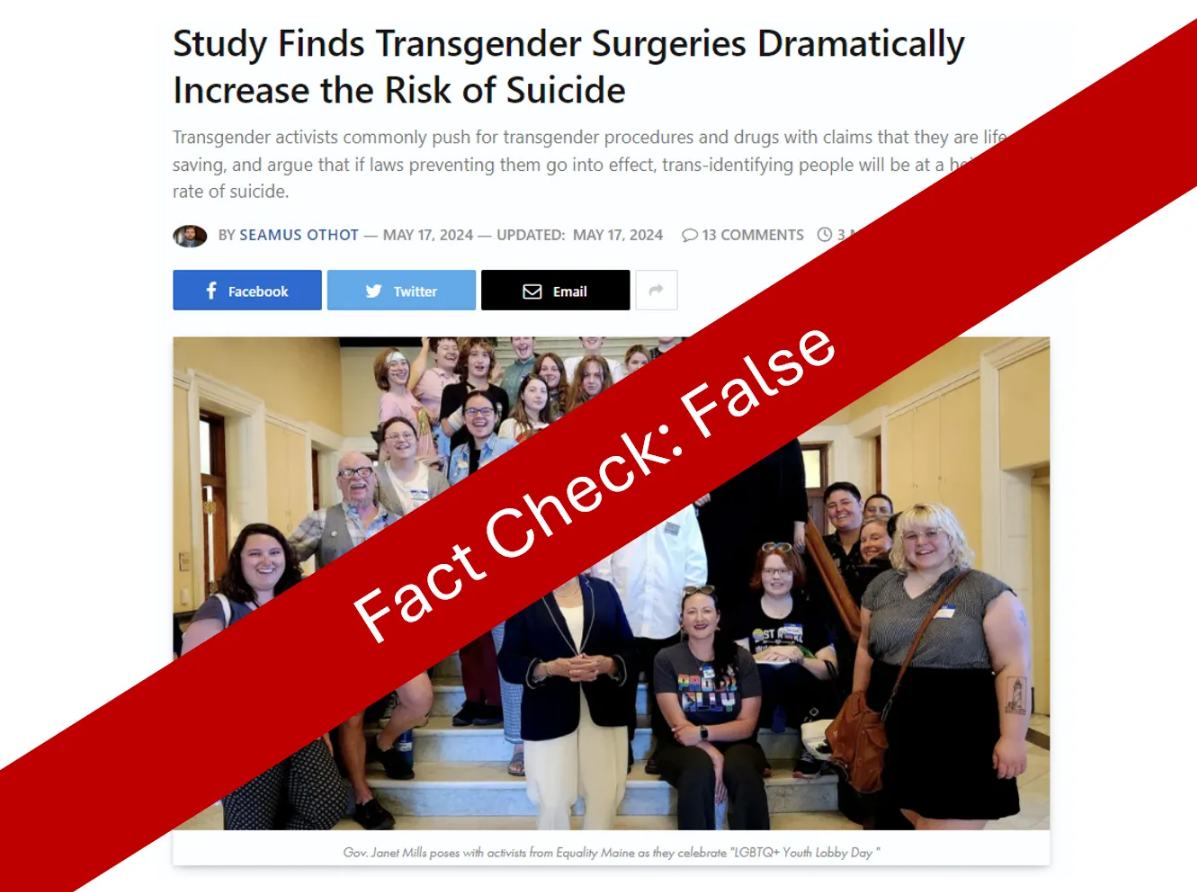
By Erin Reed | WASHINGTON – This weekend, multiple accounts and news stories were posted in far-right outlets claiming that a new study showed that “transgender surgeries dramatically increase the risk of suicide.”
The claim, based on a study published in a pseudoscience journal, as determined by Media Bias/Fact Check, was then amplified by leading anti-trans accounts on the Twitter platform, including Elon Musk himself. Upon further review, the article appears to have made critical errors that were quickly caught by expert researchers in the science of transgender care, including an egregious error in which the wrong control group was selected for the study.
The study, titled “Risk of Suicide and Self-Harm following Gender-Affirmation Surgery,” was published in the journal Cureus in April but was only recently discovered by anti-trans influencers. Importantly, Cureus is a journal known for pseudoscience and disinformation. A Media Bias/Fact Check review determined that the journal “may publish unverifiable information that is not always supported by evidence.”
The science journal watchdog organization Retraction Watch found that the journal “has retracted 56 papers” just two years after its inception. The journal is known for a poor-quality peer review process, and its motto is “peer review, not peer rejection.” Collectively, this increases the risk of major errors in publications from the journal.
The article looked at data from adults who had gender-affirming surgery and an emergency visit, comparing them with cisgender adults who had emergency visits. The study found that 3.5% of transgender adults who had surgery went to the emergency room for a suicide attempt, compared with 0.3% of cisgender controls.
The study concluded that those with gender-affirming surgery had a 12 times higher risk of suicide attempts than patients with no history of gender-affirming surgery. That number was then posted on social media and pasted into headlines proclaiming that gender-affirming surgery increases suicide rates.
Researchers into trans healthcare quickly noted a glaring error: the authors compared transgender people who have had surgery with cisgender people to determine that gender-affirming surgery raises suicide risks. To accurately assess whether transgender surgeries increase suicide risk, the correct control group would be transgender people who did not have surgery or, even more accurately, those who were denied surgery. It would be like judging the effectiveness of a new teaching method by comparing college students using the new method to those who never went to college, rather than to college students using the old method.
In fact, the study’s conclusions take on an entirely different light when considering what current research says about transgender suicide attempt rates. The Williams Institute released a study showing that 42% of transgender adults report having attempted suicide over their lifetimes.
The Journal of Interpersonal Violence put that number at 40%. A meta-analysis published in the Annals of General Psychiatry, which looked at 65 studies, found that the lifetime suicide attempt rate for transgender people is likely around 29%.
Even if one uses the lowest number from these studies, it is clear that transgender people who have had gender reassignment surgery actually have a 10 times lower rate of suicide attempts in this study. Of course, no causal claim can be made either way using this study because the study declined to include such a control group. If they had, one could expect very different headlines to emerge.
The comparison of transgender people who have had surgery with cisgender people rather than other transgender people is a relatively common mistake used to make incorrect claims about the effectiveness of transgender care.
Anti-transgender activists and politicians often cite, for instance, “the Swedish study” and incorrectly claim that it shows transgender care is ineffective, leading to a 19 times higher suicide rate. The study they cite, published in the journal PLOS One, used a similar control group of cisgender people. In that case, the control group selection was purposeful, used to evaluate health risks of transgender people compared to cisgender people. The author had to correct those misusing its findings, stating, “People who misuse the study always omit the fact that the study clearly states that it is not an evaluation of gender dysphoria treatment. If we look at the literature, we find that “several recent studies conclude that WPATH Standards of Care compliant treatment decreases gender dysphoria and improves mental health.”
Indeed, many studies show that transgender care saves lives and decreases suicidality. One study in the Annals of Plastic Surgery found that gender-affirming surgery “improved mental health outcomes” and “significantly reduced suicidal ideation.”
Another study in JAMA Surgery determined that suicidal ideation was lower among transgender people who had gender-affirming surgery compared to those who did not. They also found that “respondents who underwent all desired gender-affirming surgeries had significantly lower odds of past-year suicide attempts.”
Importantly, this study used the correct control group: transgender people who did not have all of their desired gender-affirming surgeries. A Cornell University review of gender affirming care looked at over 50 papers and determined that “gender transition is effective in treating gender dysphoria and can significantly improve the well-being of transgender individuals.”
Despite this, many anti-trans influencers and far-right media outlets amplified the incorrect claim that transgender surgery increases suicides. The Babylon Bee posted, “Risk of suicide increases 12x after ‘gender-affirming’ surgery … is anyone surprised?” Elon Musk then amplified the article, saying, “extremely concerning.” The post was viewed over 26 million times.
Anti-trans accounts such as Seth Dillon, Chad Felix Greene, Jonathan Kay, and Katy Faust also amplified the incorrect claim. Jordan Peterson used the study to claim that doctors were “butchers.” Far-right conservative media such as The Daily Wire and Breitbart made similar incorrect claims of increased suicide rates.
Disinformation around transgender care is easily weaponized by politicians relying on social media to justify their political decision-making processes. None of the posts about the study received any community notes on the Twitter platform, despite many being submitted to correct the error.
This is a serious failing of the Community Notes feature, which is supposed to correct misinformation. As a result, incorrect information about transgender care has been allowed to spread with little pushback, reaching tens of millions of people. Fact-checkers and those who run platforms should better protect their platforms against this kind of egregious disinformation.
******************************************************************************************

Erin Reed is a transgender woman (she/her pronouns) and researcher who tracks anti-LGBTQ+ legislation around the world and helps people become better advocates for their queer family, friends, colleagues, and community. Reed also is a social media consultant and public speaker.
******************************************************************************************
The preceding article was first published at Erin In The Morning and is republished with permission.
Political commentary & analysis
20 bills die as Iowa Legislature adjourns-attacks on LGBTQ+ fail
Iowa becomes the latest state to adjourn Sine Die without passing a single piece of explicitly anti-LGBTQ+ legislation

By Erin Reed – DES MOINES, Iowa – In the latest in a series of victories for trans and queer people in statehouses across the United States, Iowa’s legislature has adjourned sine die without passing a single piece of explicitly anti-LGBTQ+ legislation.
This is despite more than 20 bills being introduced targeting LGBTQ+ individuals, including some introduced and prioritized by the governor herself.
Other states, which have historically shown a willingness to pass LGBTQ+ legislation, have also failed in efforts to pass such legislation this year, including Florida, Georgia, and West Virginia. This is leaving some to wonder if anti-trans and anti-queer politics are beginning to run into resistance, at least in the lead-up to the 2024 election fight.
This year, Iowa was at the center of numerous debates over anti-LGBTQ+ legislation, particularly targeting transgender individuals. One bill aimed to remove transgender people from the state’s civil rights code and declare them “disabled.”
Another proposal, known as the “pink triangle bill,” would have required special gender markers on the birth certificates and driver’s licenses of transgender people. One bill would have redefined “equal” to no longer mean “same” or “identical” for transgender people.
A further measure sought to ban transgender individuals from restrooms that match their gender identity. Nonetheless, all of these bills failed to pass as the legislature reached its closing hours.
This is not due to a lack of effort by a handful of Republican legislators who saw this as their priority issue. In the final moments of the session, sensing defeat, Republicans attempted to pass an anti-transgender birth certificate bill by introducing an amendment to ban such certificates onto a bill supporting the loved ones of fallen veterans.
Perhaps realizing that such a move would likely be seen as politically unpopular, they withdrew the amendment before the legislature adjourned.
Over 20 bills targeting the LGBTQ+ community that were introduced this year died. Counting rollover bills from the previous year, Iowa Safe Schools states that number is as high as 39 bills that have been defeated.
The only bills to pass was a broad “religious freedom restoration act,” which could allow broad discrimination against LGBTQ+ people and many other classes of people using religion as a shield, as well as a DEI ban. Though both bills have negative impacts on LGBTQ+ people, neither bill contained the targeted provisions seen in several others that were introduced this year.
Iowa has been the site of fierce resistance to anti-LGBTQ+ legislation this year. For one piece of legislation removing transgender people from the state civil rights code, over 300 people lined up in the hallway to speak out against the bill. When the bill was defeated in committee, cheers could be heard throughout the hallway.
Responding to that bills defeat at the time, Damian Thompson of Iowa Safe Schools stated, “From what I can tell, opposition was overwhelming, before the hearing, during the hearing, and after the hearing.” He later added, “This is the kind of response we need to see with every anti-LGBTQ legislation. We need the entire community united in opposition. What they are trying to do, we’ve seen it, they are trying to divide us. The LGB against the T, and it’s not going to work.”

Iowa is not the only state to witness significant victories over anti-LGBTQ+ and anti-trans legislation this year. Earlier, all explicitly anti-LGBTQ+ bills—20 in total—were defeated in Florida, prompting a statement from local HRC advocates that “The tide is turning.”
Similarly, over 20 bills failed in West Virginia, leading to celebrations. In Georgia, every anti-LGBTQ+ bill also failed, despite similar last-minute attempts to amend anti-LGBTQ+ legislation into entirely unrelated bills.
Although attacks on trans and queer individuals have encountered significant obstacles in Iowa and other states historically targeting LGBTQ+ people, some states are advancing with particularly severe legislation.
These states include Tennessee, Alabama, Mississippi, and Louisiana, all of which have introduced bills that would ban transgender people from bathrooms, allow individuals with religious objections to adopt LGBTQ+ children, and more.
Meanwhile, Ohio is moving forward with a bathroom ban that could affect transgender adults in colleges, and Utah has already passed a sweeping bathroom and locker room ban this year. Additionally, the United States presidential election is already witnessing political attacks on transgender individuals, which may intensify in the coming months.
For transgender Iowans, however, any further attacks will have to wait until the outcomes of the 2024 election cycle are clear. Early indications from Iowa suggest that such attacks may not be politically popular in the state.
For example, Moms For Liberty candidates were defeated in 12 of 13 highly contested school board elections in the state in 2023. Additionally, Pella, Iowa—a town that favored Trump by over 35 points—defeated a local book ban.
If similar election results occur in 2024, then attacks on LGBTQ+ individuals may continue to falter in the state, giving its trans and queer residents a moment to breathe as they begin the long battle to roll back harsh laws targeting LGBTQ+ people enacted in recent years.
****************************************************************************

Erin Reed is a transgender woman (she/her pronouns) and researcher who tracks anti-LGBTQ+ legislation around the world and helps people become better advocates for their queer family, friends, colleagues, and community. Reed also is a social media consultant and public speaker.
******************************************************************************************
The preceding article was first published at Erin In The Morning and is republished with permission.
Political commentary & analysis
Anti-trans British pediatrician backpedals on her review on HRT
Dr. Cass’s latest statements are likely to cast more doubt on the study, which disregarded substantial evidence on trans care

By Erin Reed | WASHINGTON – In the latest twist over the Cass Review, a controversial report released in England last week targeting transgender care, the review’s leader has seemingly walked back recommendations and findings that have already led to a crackdown on transgender care in the United Kingdom.
Dr. Hillary Cass, in an interview with LGBTQ+ organizations, reportedly stated that puberty blockers and hormone therapy should be made available at differing ages based on individual need, and that current policies in England often result in those medications being offered too late. This stands in stark contrast to the report itself, which presents much more restrictive findings and recommendations on trans youth care that have been used to ban treatments in the UK and cited by far-right organizations behind bans in the United States.
The Cass Review was commissioned and produced in England in the wake of political attacks on transgender people in the United Kingdom after clinic closures and skyrocketing wait times. The “independent” review was lead by Dr. Hillary Cass, who reportedly followed several anti-trans organizations on social media and who met with Governor DeSantis’ medical board and offered information in their efforts to ban care in Florida, leading to some to question that independence. Last week, the final review was published, leading to bans on puberty blockers in the country, citing the report as justification for doing so.
The report disregarded a substantial amount of evidence for transgender care as not “high quality” enough and then described the evidence surrounding transgender care as weak, despite other reviews, major medical organizations, and the largest psychological organization in the world finding the evidence compelling enough to support gender affirming care. This has led to a group of over 100 Irish academics decrying the review in a group letter. The report made a series of recommendations, such as Recommendation 8, which states that hormone therapy is available for 16-year-olds but should be administered with “extreme caution,” and encourages clinicians to delay the treatment until age 18 unless there are “clear rationales” for earlier intervention. It also called for significant restrictions on puberty blockers, limiting them to research studies only. These recommendations and Cass’s findings have been used to justify severe crackdowns on transgender care.
See recommendation 8 here:
Now, in an interview first reported on twitter by TransSafetyNow, Dr. Hillary Cass appears to substantially walk back much of her review, interpretations of that review, and even attempts to brush off her meetings with political appointees in the DeSantis administration who met with her to obtain information they would later attempt to use to ban trans care there. In the interview with UK-based LGBTQ+ organization The Kite Trust, Dr. Hillary Cass is asked if she believes it is OK to prescribe puberty blockers. Her answer is significantly out of alignment with her report:
“In the data the Cass Review examined, the most common age that trans young people were being initially prescribed puberty suppressing hormones was 15. Dr. Cass’s view is that this is too late to have the intended benefits of suppressing the effects of puberty and was caused by the previous NHS policy of requiring a trans young person to be on puberty suppressing hormones for a year before accessing gender affirming hormones. The Cass Review Report recommends that a different approach is needed, with puberty suppressing hormones and gender affirming hormones being available to young people at different ages and developmental stages alongside a wider range of gender affirming healthcare based on individual need.”
Her answer aligns more closely with the current provision of transgender care in many countries, where individual needs and circumstances are prioritized for each patient. However, this is not the tone of the report, which has been used to advocate for significant restrictions and even outright bans. In the United States, the report has been cited by the Heritage Foundation (retweeted) and the Alliance Defending Freedom, organizations that have been actively involved in bans on trans care. In the United Kingdom, the report has even prompted an inquest into adult trans care, raising concerns about its potential impact on this care as well.
Some have accused her answers in the interview as being an attempt to deflect criticism. This is particularly evident in her response regarding a meeting with Dr. Patrick Hunter, a Catholic Medical Association doctor who was tapped by Governor Ron DeSantis in the United States to ban transgender care. Following the publication of the Florida reviews and standards of care, which bears a resemblance to the Cass Review, lawsuits revealed that the review was deceitfully conducted. Evidence, including a PowerPoint document, showed that the decision to ban trans care had been made before the review had even begun. Documents produced by the lawsuit also revealed that Dr. Cass had taken a meeting and exchanged emails with the Florida team.
Dr. Cass, in the latest interview, denies any wrongdoing, stating:
“Patrick Hunter approached the Cass Review stating he was a paediatrician who had worked in this area. The Cass Review team were not aware of his wider connections and political affiliations at this time and so he met the criteria for clinicians who were offered an initial meeting. This initial contact was the same as any paediatrician who approached the study. The Cass Review team declined any further contact with Patrick Hunter after this meeting. Patrick Hunter and his political connections has had no influence on the content of the Cass Review Report.”
However, in a new email made exclusively available to “Erin In The Morning,” Dr. Cass’s denial of impropriety does not appear to tell the whole story. Although she claims that she was not aware of his political affiliations, we learn that the meeting was actually set up by Dr. Riittakerttu Kaltiala, a member of the Cass Advisory Board (declared in her conflicts of interest) whom Dr. Patrick Hunter says has worked with him many times in the past. In this email, we also learn that Dr. Cass followed up with information she wanted to share with the board.
Furthermore, Dr. Cass’s claim that this was the only meeting between members of the Cass Review team and medical board members appointed by Governor DeSantis to ban care is contradicted by a court deposition citing “regular meetings” with Dr. Kaltiala, the member of the Cass Review Advisory Board who arranged the meeting between Dr. Cass and Dr. Hunter.
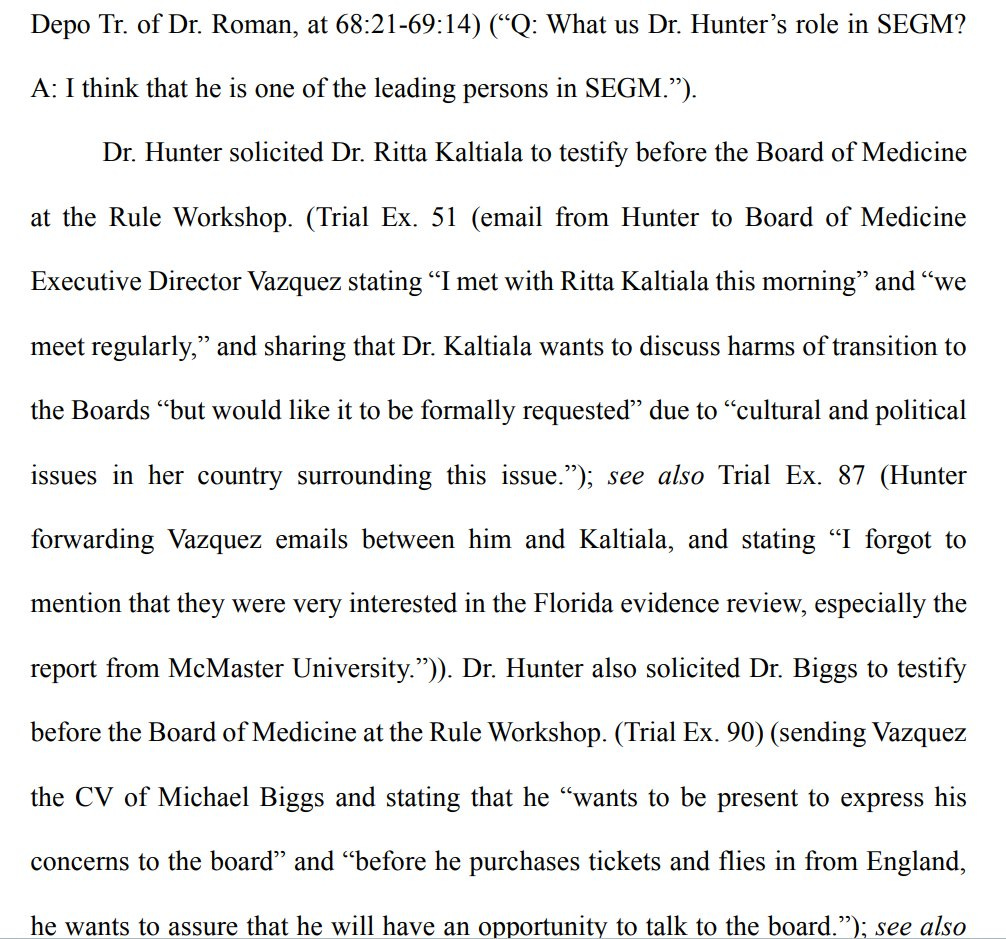
The interview is likely to further embroil the Cass Review in scandal both in the United Kingdom and internationally. It seems to represent a significant attempt to deflect criticism from the report by softening some of its conclusions. Moreover, the defensive tone of the report regarding those who influenced its production and meetings with politically charged appointees, who themselves have faced scrutiny over unethical and deceitful practices in reports on transgender healthcare, is bound to raise eyebrows.
However, it remains to be seen whether politicians in England or in red states in the United States, who are aggressively seeking any pretext to restrict care, will pause their efforts even with Dr. Cass tempering the implications of her report.
****************************************************************************

Erin Reed is a transgender woman (she/her pronouns) and researcher who tracks anti-LGBTQ+ legislation around the world and helps people become better advocates for their queer family, friends, colleagues, and community. Reed also is a social media consultant and public speaker.
******************************************************************************************
The preceding article was first published at Erin In The Morning and is republished with permission.
Political commentary & analysis
The impact of the Supreme Court’s Idaho ruling on trans people
The ruling is complicated & will have an immediate impact for trans youth in Idaho and could have national repercussions

By Erin Reed | WASHINGTON – On Monday, news broke that the Supreme Court of the United States will allow Idaho to enforce its ban on gender-affirming care for transgender youth, a felony ban that makes trans care punishable by up to 10 years in prison for doctors who provide it to those under 18.
The ruling was not based on the merits of gender-affirming care or its constitutionality; rather, it addressed broad injunctions and a lower court’s ability to block a law fully at the earliest stages — a pet issue for some conservative justices who chose to take decisive action when transgender lives were at stake.
The immediate impact of the ruling is clear: transgender individuals will be barred from obtaining gender-affirming care in Idaho, except for only two plaintiffs, despite no rationale for how a ban is supposed to work for everyone but those two plaintiffs when doctors are broadly barred from providing care. In other states where anti-trans laws are being litigated, the impacts are more nebulous, and the ruling could impact many other issues as well.
The case in question stems from a challenge to Idaho’s felony ban on gender-affirming care. In December 2023, a federal judge ruled that the ban was likely unconstitutional, ruling in favor of two transgender minor plaintiffs using pseudonyms.
The judge stated that the right to obtain medically necessary care for your children is “deeply rooted in this nation’s history and traditions,” using the logic from the anti-abortion Dobbs decision against transgender care bans as an apparent preemptive strike at such language being utilized to justify bans on trans care should the case ever reach the Supreme Court.
The judge then issued a broad preliminary injunction that prevented the state from enforcing the law on anyone while the court process played out.
It was the breadth of the injunction that came under dispute in the Supreme Court, not issues directly related to the constitutionality of transgender care. Attorneys for the state of Idaho argued that the injunction was too broad and that the state should be allowed to enforce the law on everyone except for the plaintiffs.
This would force anyone seeking care to seek individual exceptions and rulings from federal courts, an expensive endeavor. On the other hand, attorneys for the plaintiffs pointed out that the broad injunction was necessary: the plaintiffs were using pseudonyms to preserve their anonymity.
Without a broad preliminary injunction, doctors would be unlikely to continue offering care, thus making it impossible for the plaintiffs to access that care even with a ruling in their favor, and in doing so, they would have to forfeit their anonymity.
The majority of the court sided with reversing the injunction and allowing the law to go into effect for everyone but the plaintiffs, with a plurality signing onto Justice Gorsuch’s opinion stating that the ability of judges to issue broad preliminary injunctions should be muted.
They had little to say about the constitutionality of the law itself, except for Justices Kavanaugh and Barrett, who wrote in their separate concurrence that they believe the state may a likelihood of success on the merits [Update: Law Dork’s Chris Geidner states that the “merits” here, as Kavanaugh described it in his opinion, are about the scope of the injunction, and so it may not necessarily signal Kavanaugh and Barrett’s votes on the challenges to the gender-affirming care bans].
Instead, the real impact of this case will likely be on justices issuing broad preliminary injunctions to block statewide laws in the early stages of a constitutional challenge; it should not immediately impact any anti-trans laws being decided on the merits.
Of course, this provides little consolation to transgender young people in Idaho, who will have to go without access to their medication in the state even though two courts have ruled that the law blocking them is likely unconstitutional. It also raises questions about other broad preliminary injunctions nationwide on transgender topics: we likely cannot expect each student to take their school to federal court every time they want to challenge an individual bathroom ban in their local high school, for instance.
These questions have a significant impact on transgender individuals but will not only affect transgender people. They will arise anytime a state passes a law that is broadly enjoined at the preliminary stage by lower courts. This issue has surfaced in many other cases, from ghost guns to the mifepristone case, where sometimes broad preliminary injunctions are viewed favorably by the same justices who just ruled negatively on them for transgender individuals.
The impact of the ruling will likely be initially muted for transgender people nationwide. While it will have a significant impact in Idaho, there are no cases currently pending on transgender healthcare where a broad federal preliminary injunction is in place, other than in Idaho.
The case in Arkansas, for instance, has moved well beyond the preliminary injunction stage and has been ruled unconstitutional on the merits. However, numerous other cases are still being litigated, and states are enjoined on a wide range of topics, many of which have been broadly enjoined while awaiting a final constitutional ruling on the law. It remains to be seen if any of these broad injunctions are similarly challenged.
It is also important to note that this will not impact any rulings made under state-level litigation. For instance, in Montana, a ban on gender-affirming care is enjoined from enforcement using the state constitution’s right to seek “safety, health, and happiness in all lawful ways,” as well as an explicit right to privacy.
Meanwhile, in Ohio, a state challenge is currently underway using a provision in the state constitution that bars the state from issuing penalties for obtaining or providing healthcare. These state challenges will be insulated from anything that happens at the Supreme Court level.
Still, the ruling will mean further hardship for transgender youth in Idaho, and could signal that the Supreme Court is willing to take drastic action when it comes to transgender healthcare, even if that action is not directly related to the merits of the healthcare bans themselves. The Supreme Court could address the issue on the merits at any time, and it seems increasingly likely that it will in the near future.
****************************************************************************

Erin Reed is a transgender woman (she/her pronouns) and researcher who tracks anti-LGBTQ+ legislation around the world and helps people become better advocates for their queer family, friends, colleagues, and community. Reed also is a social media consultant and public speaker.
******************************************************************************************
The preceding article was first published at Erin In The Morning and is republished with permission.
-

 Theater4 days ago
Theater4 days agoGeffen Playhouse’s The Reservoir finds queer humor and joy in recovery and loss
-

 COMMENTARY3 days ago
COMMENTARY3 days agoUSAID’s demise: America’s global betrayal of trust
-

 a&e features3 days ago
a&e features3 days agoHow this Texas drag king reclaimed their identity through Chicano-inspired drag
-

 Obituary2 days ago
Obituary2 days agoThe queer community mourns the loss of trailblazer Jewel Thais-Williams
-

 Television2 days ago
Television2 days agoICYMI: ‘Overcompensating’ a surprisingly sweet queer treat
-

 a&e features4 days ago
a&e features4 days agoFrom Drag Race to Dvořák: Thorgy Thor takes the Hollywood Bowl for Classical Pride
-

 Arts & Entertainment4 days ago
Arts & Entertainment4 days agoMary Lambert Returns With a Battle Cry in new single, “The Tempest”
-

 Opinions16 hours ago
Opinions16 hours agoThe psychology of a queer Trump supporter: Navigating identity, ideology, and internal conflict
-

 Living14 hours ago
Living14 hours agoFaithfully queer: Finding God and growth in Modern Orthodoxy
-

 Breaking News2 hours ago
Breaking News2 hours agoTrump administration sues California over trans student-athletes







